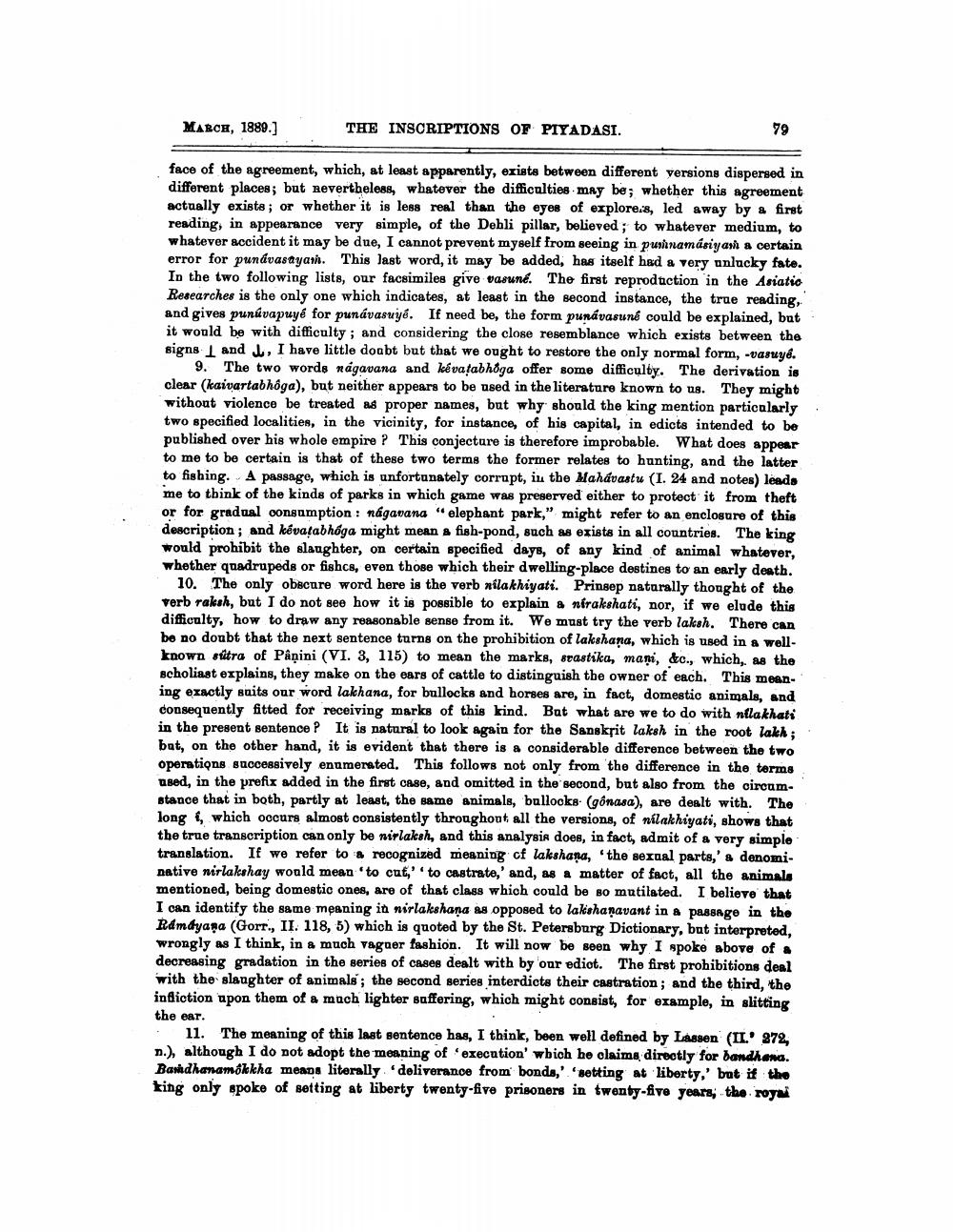________________
MARCE, 1889.]
THE INSCRIPTIONS OF PIYADASI.
79
face of the agreement, which, at least apparently, exists between different versions dispersed in different places; but nevertheless, whatever the difficulties may be; whether this agreement actually exists; or whether it is less real than the eyes of explore:8, led away by a first reading, in appearance very simple, of the Dehli pillar, believed ; to whatever medium, to whatever accident it may be due, I cannot prevent myself from seeing in puranamásiyasi a certain error for punávasayan. This last word, it may be added, has itself had a very unlucky fate. In the two following lists, our facsimiles give vasune. The first reproduction in the Asiatio Researches is the only one which indicates, at least in the second instance, the true reading, and gives punúvapuyé for punávasuyé. If need be, the form punávasune could be explained, but it would be with difficulty; and considering the close resemblance which exists between the signs 1 and J, I have little doubt but that we ought to restore the only normal form, -vasuya.
9. The two words nagavana and kévatabhoga offer some difficulty. The derivation is clear (kaivartabhôga), but neither appears to be used in the literature known to us. They might without violence be treated as proper names, but why should the king mention particularly two specified localities, in the vicinity, for instance, of his capital, in edicts intended to be published over his whole empire? This conjecture is therefore improbable. What does appear to me to be certain is that of these two terms the former relates to hunting, and the latter to fishing. A passage, which is unfortunately corrupt, in the Mahávastu (I. 24 and notes) leads me to think of the kinds of parks in which game was preserved either to protect it from theft or for gradual consumption: nagavana " elephant park," might refer to an enclosure of this description; and kévatabhôga might mean a fish-pond, such as exists in all countries. The king would prohibit the slaughter, on certain specified days, of any kind of animal whatever, whether quadrupeds or fishcs, even those which their dwelling-place destines to an early death.
10. The only obscure word here is the verb Rilakhiyati. Prinsep naturally thought of the verb raksh, but I do not see how it is possible to explain a nirakshati, nor, if we elude this difficulty, how to draw any reasonable sense from it. We must try the verb laksh. There can be no doubt that the next sentence turns on the prohibition of lakshana, which is used in a wellknown sútra of Pâņini (VI. 3, 115) to mean the marks, srastika, mani, &c., which, as the scholiast explains, they make on the ears of cattle to distinguish the owner of each. This meaning exactly suits our word lakhana, for bullocks and horses are, in fact, domestic animals, and consequently fitted for receiving marks of this kind. But what are we to do with nflakhati in the present sentence? It is natural to look again for the Sanskpit laksh in the root lakh ; bat, on the other hand, it is evident that there is a considerable difference between the two operations successively enumerated. This follows not only from the difference in the terms used, in the prefix added in the first case, and omitted in the second, but also from the circumstance that in both, partly at least, the same animals, bullocks (gônasa), are dealt with. The long, which occurs almost consistently throughout all the versions, of nilakhiyati, shows that the true transcription can only be nirlaksh, and this analysis does, in fact, admit of a very simple translation. If we refer to recognized meaning of lakshana, 'the sexual parts,' a denominative nirlakshay would mean 'to cut,' to castrate,' and, as a matter of fact, all the animals mentioned, being domestic ones, are of that class which could be so mutilated. I believe that I can identify the same meaning in nirlakshana as opposed to lakshanavant in a passage in the R&mdyana (Gorr., II. 118, 5) which is quoted by the St. Petersburg Dictionary, but interpreted, wrongly as I think, in a much vagaer fashion. It will now be seen why I spoke above of a decreasing gradation in the series of cases dealt with by our ediot. The first prohibitions deal with the slaughter of animals; the second series interdicts their castration; and the third, the infliction upon them of a much lighter suffering, which might consist, for example, in slitting the ear. • 11. The meaning of this last sentence has, I think, been well defined by Lassen (II.' 272, n.), although I do not adopt the meaning of 'execution' which he claims directly for bandhana. Basidhanamökkha means literally deliverance from bonds, 'setting at liberty,' but it the ting only spoke of setting at liberty twenty-five prisoners in twenty-five years, the royai




